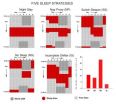(Press-News.org) A new study published in Clinical & Experimental Allergy reveals that there is no association between a restaurant worker's knowledge of food allergy and his or her confidence in being able to provide a safe meal to a food allergic customer.
Food allergies are common, affecting 2% of adults and as much as 8% of children in the UK alone. Allergic reactions can cause a wide variety of symptoms, the most serious being anaphylaxis, which can cause death.
Led by Professor Helen Smith of Brighton & Sussex Medical School, UK, researchers telephoned 90 table-service restaurants in Brighton to assess staff knowledge of food allergy and determine how comfortable they felt providing meals to food allergic customers.
Responses demonstrate apparent gaps in restaurant staff's knowledge of food allergy. In one out of three kitchens, common food allergens (e.g. eggs, peanuts, wheat, milk, nuts, fish) were not separated from other foods. One in five staff members thought that an allergic customer consuming a small amount of allergen would be safe, as would removing the allergen from a finished meal (e.g. picking the nuts off a pre-prepared desert would render it safe for a nut-allergic customer to eat).
Only one third of respondents had received any sort of food allergy training, but nonetheless 80% reported confidence in providing a safe meal for their food-allergic customers.
"Diners who are food allergic must remain vigilant and not assume restaurants are safe or that all staff are knowledgeable about food allergy," Smith notes. "Our survey supports the need for more rigorous and accessible training if food-allergic customers are to avoid being put at risk by dining out."
### END
Many restaurant staff are undertrained and misinformed about food allergies
2011-04-15
ELSE PRESS RELEASES FROM THIS DATE:
Reproductive Medicine Associates of Philadelphia Announces That They Will Offer Free 30-Minute Consultations During National Infertility Awareness Week
2011-04-15
RMA's King of Prussia office is located in King of Prussia at 625 Clark Avenue, Suite 17 B, call 215.654.1544, and their Center City Philadelphia office is located at 1015 Chestnut Street, Suite 1500, call 215.922.1556.
RMA of Philadelphia has four locations in the Delaware Valley - King of Prussia, Langhorne, Philadelphia, and Willow Grove - and is a highly experienced fertility team that provides comprehensive infertility treatment services, ranging from basic consultations and fertility evaluations to advanced reproductive surgical procedures, and when indicated, ...
Heart needs work after heart attack: U of A study challenges the notion that the heart must rest
2011-04-15
(Edmonton) A new study by researchers at the University of Alberta shows that for best results in stable patients after a heart attack, early exercise as well as prolonged exercise is the key to the best outcomes.
Study co-authors Mark Haykowsky, researcher in the Faculty of Rehabilitation Medicine, and Alex Clark, researcher in the Faculty of Nursing, along with fellow U of A researchers Don Schopflocher in the School of Public Health and Ian Paterson in the Faculty of Medicine & Dentistry, as well as colleagues from Duke, Stanford and UBC, reviewed more than 20 years ...
Eyes of rock let chitons see predators
2011-04-15
(Santa Barbara, Calif.) –– Using eyes made of a calcium carbonate crystal, a simple mollusk may have evolved enough vision to spot potential predators, scientists say.
Daniel Speiser, a postdoctoral fellow in the Department of Ecology Evolution and Marine Biology at UC Santa Barbara, studied mollusks that he collected in the Florida Keys. His research of their vision, performed during his graduate studies at Duke University, resulted in a study published today by Current Biology.
The three-inch-long mollusks, called chitons, have hundreds of eye-like structures with ...
Business Education Simulations from Realityworks, Inc. Highlighted in Scholastic Administrator Magazine "Best in Technology" Article
2011-04-15
Experiential learning technology that allows students to simulate a real business office environment was recently featured in the Scholastic Administrator Spring 2011 magazine. The article, entitled "Best in Tech: Piloting New Technology", showcased a review by Ruthie Bass of North Shore Senior High School, Galena Park ISD in Houston, Texas of Business Education Simulations program from Realityworks, Inc.
The Scholastic Administrator article highlights district leaders piloting programs with new technologies and how they are incorporating them into the classroom. The ...
Rising star of brain found to regulate circadian rhythms
2011-04-15
BOSTON (April 14, 2011, noon ET) — The circadian system that controls normal sleep patterns is regulated by a group of glial brain cells called astrocytes, according to a study published online on April 14th in Current Biology, a Cell Press publication. Neuroscientists from Tufts University School of Medicine found that disruption of astrocyte function in fruit flies (Drosophila) led to altered daily rhythms, an indication that these star-shaped glial cells contribute to the control of circadian behavior. These results provide, for the first time, a tractable genetic model ...
Carbon sequestration estimate in US increased -- barring a drought
2011-04-15
CORVALLIS, Ore. – A research group has concluded that forests and other terrestrial ecosystems in the lower 48 states can sequester up to 40 percent of the nation's fossil fuel carbon emissions, a larger amount than previously estimated – unless a drought or other major disturbance occurs.
Widespread droughts, such as those that occurred in 2002 and 2006, can cut the amount of carbon sequestered by about 20 percent, the scientists concluded in a recent study that was supported by the National Science Foundation and U.S. Department of Energy.
The research, published ...
Study: Compassion, not sanctions, is best response to workplace anger
2011-04-15
Challenging traditional views of workplace anger, a new article by a Temple University Fox School of Business professor suggests that even intense emotional outbursts can prove beneficial if responded to with compassion.
Dr. Deanna Geddes, chair of the Fox School's Human Resource Management Department, argues that more supportive responses by managers and co-workers after displays of deviant anger can promote positive change at work, while sanctioning or doing nothing does not.
"The trouble with sanctions: Organizational responses to deviant anger displays at work," ...
Toward a more efficient use of solar energy
2011-04-15
This release is available in German.
The exploitation and utilization of new energy sources are considered to be among today's major challenges. Solar energy plays a central role, and its direct conversion into chemical energy, for example hydrogen generation by water splitting, is one of its interesting variants. Titanium oxide-based photocatalysis is the presently most efficient, yet little understood conversion process. In cooperation with colleagues from Germany and abroad, scientists of the KIT Institute for Functional Interfaces (IFG) have studied the basic mechanisms ...
Wikipedia deemed a reliable source for political info by new study
2011-04-15
Not so long ago Wikipedia was considered a playground for Capitol Hill staffers to game the system and make "the boss look better and the opponent look ridiculous."
Now a peer-reviewed study by Brigham Young University political scientist Adam Brown validates Wikipedia as a reliable place to get a political education.
The research focused on past and present candidates for governor across the 50 states. Brown fact-checked biographical information and voting statistics and found very few inaccuracies.
"My finding is optimistic for the health of our country," said ...
A sleep strategy commonly used by night nurses throws off their circadian clocks
2011-04-15
As many as 25 percent of hospital nurses go without sleep for at least 24 hours in order to adjust to working on the night shift, which is the least effective strategy for adapting their internal, circadian clocks to a night-time schedule.
That is one of the results of the first study to examine the strategies that night nurses use to adjust between day and night sleep cycles. The study was based on questionnaires from 388 nurses who work at the Vanderbilt University Medical Center and the results are published in the April 13 issue of the scientific journal, Public ...

